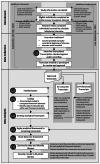A novel perspective of Australian primary care dietetics: Insights from an exploratory study using complex adaptive systems theory
- PMID: 35692187
- PMCID: PMC9545103
- DOI: 10.1111/1747-0080.12742
A novel perspective of Australian primary care dietetics: Insights from an exploratory study using complex adaptive systems theory
Abstract
Aims: Effective quality improvement strategies are essential to enhancing outcomes of dietetic care. Interventions informed by complex adaptive systems theory have demonstrated effectiveness in other healthcare settings. This study aimed to explore primary care dietetics practice using complex adaptive systems theory and to identify factors that individuals across the healthcare system can examine and address to improve the quality of dietetic care.
Methods: Qualitative analysis of semi-structured interviews of healthcare consumers and professionals involved in the provision of dietetic care. Data collection and analysis was guided by a complexity-informed conceptual framework. The Framework Method was used to code transcripts and identify themes describing primary care dietetics.
Results: Twenty-three consumers and 26 primary care professionals participated. Participants described dietetic care as being delivered by individuals organised into formal and informal systems that were influenced by the wider environment, including legal, economic, and socio-cultural systems. Dietitians described interactions with consumers as a learning opportunity and sought education, mentoring, or supervision to address knowledge and skill gaps. Relationships underpinned transfer of information between individuals.
Conclusion: Complex adaptive systems theory proved to be a useful conceptual framework for primary care dietetics. Factors identified at the macro (e.g., funding), meso (e.g., professional networks), and micro (e.g., consumer education) levels should be examined and addressed to improve the quality of dietetic care.
Keywords: complex adaptive systems; primary care; private practice; qualitative research; quality of care; systems analysis.
© 2022 The Authors. Nutrition & Dietetics published by John Wiley & Sons Australia, Ltd on behalf of Dietitians Australia.
Conflict of interest statement
There are no conflicts of interest to declare.
Figures


Similar articles
-
Developing the Quality in Nutrition Care Model for Dietitians (QUINCE-MOD) in primary care: A mixed-method survey of healthcare consumers and professionals.J Hum Nutr Diet. 2023 Feb;36(1):311-322. doi: 10.1111/jhn.13065. Epub 2022 Jul 31. J Hum Nutr Diet. 2023. PMID: 35822586 Free PMC article.
-
The tension between efficiency and effectiveness: a study of dietetic practice in primary care.J Hum Nutr Diet. 2019 Apr;32(2):259-266. doi: 10.1111/jhn.12617. Epub 2019 Jan 2. J Hum Nutr Diet. 2019. PMID: 30604495
-
Perceptions of private practice dietitians regarding the collection and use of outcomes data in primary healthcare practices: A qualitative study.J Hum Nutr Diet. 2022 Feb;35(1):154-164. doi: 10.1111/jhn.12950. Epub 2021 Oct 4. J Hum Nutr Diet. 2022. PMID: 34605085
-
Minimum reporting standards for process and outcomes assessments for private practice dietitians working in Australian primary care: The Thought Leader Consensus study.Nutr Diet. 2023 Jun;80(3):284-296. doi: 10.1111/1747-0080.12776. Epub 2022 Oct 10. Nutr Diet. 2023. PMID: 36217703 Free PMC article. Review.
-
Exploring stakeholder experiences of dietetic service and care delivery: A systematic qualitative review.J Hum Nutr Diet. 2023 Feb;36(1):288-310. doi: 10.1111/jhn.13063. Epub 2022 Jul 29. J Hum Nutr Diet. 2023. PMID: 35833488 Free PMC article.
Cited by
-
Integrating Systems Thinking in Nutrition and Dietetics Education.J Hum Nutr Diet. 2025 Apr;38(2):e70036. doi: 10.1111/jhn.70036. J Hum Nutr Diet. 2025. PMID: 40065542 Free PMC article.
-
Developing the EQUIPED approach to quality management using multi-grounded theory.Nutr Diet. 2023 Jun;80(3):273-283. doi: 10.1111/1747-0080.12780. Epub 2022 Oct 24. Nutr Diet. 2023. PMID: 36278267 Free PMC article.
-
Developing the Quality in Nutrition Care Model for Dietitians (QUINCE-MOD) in primary care: A mixed-method survey of healthcare consumers and professionals.J Hum Nutr Diet. 2023 Feb;36(1):311-322. doi: 10.1111/jhn.13065. Epub 2022 Jul 31. J Hum Nutr Diet. 2023. PMID: 35822586 Free PMC article.
References
-
- Mitchell L, Ball L, Ross L, et al. Effectiveness of dietetic consultations in primary health care: a systematic review of randomized controlled trials. J Acad Nutr Diet. 2017;117(12):1941‐1962. - PubMed
-
- Ball L, Davmor R, Leveritt M, Desbrow B, Ehrlich C, Chaboyer W. The nutrition care needs of patients newly diagnosed with type 2 diabetes: informing dietetic practice. J Hum Nutr Diet. 2016;29(4):487‐494. - PubMed
Publication types
MeSH terms
LinkOut - more resources
Full Text Sources

